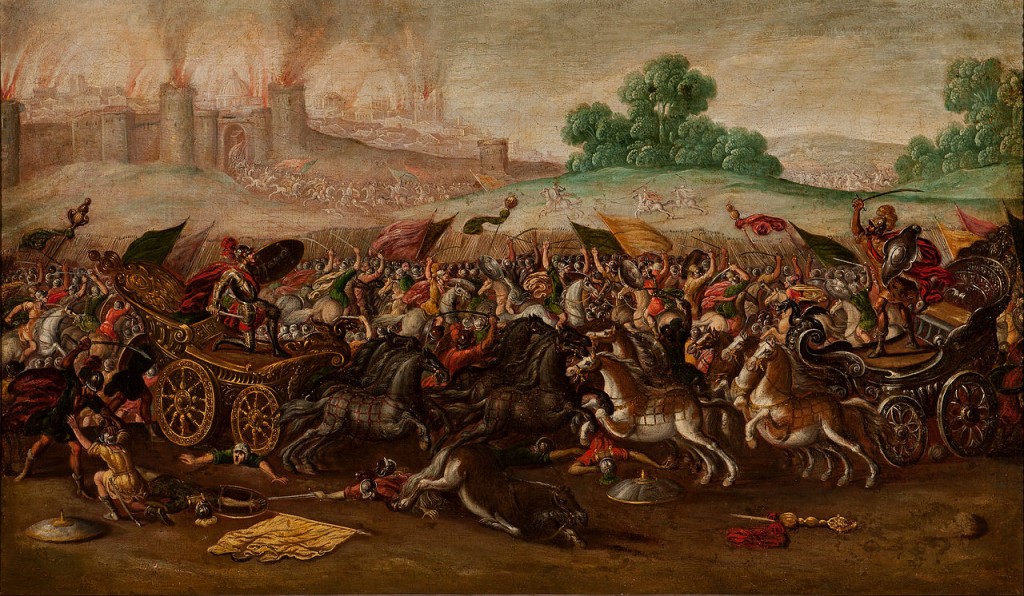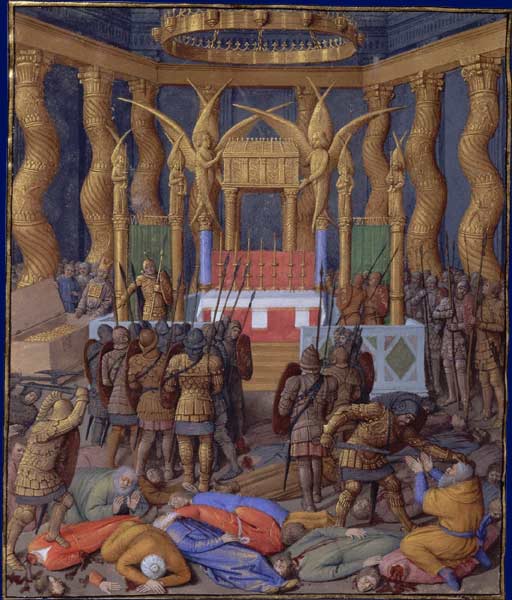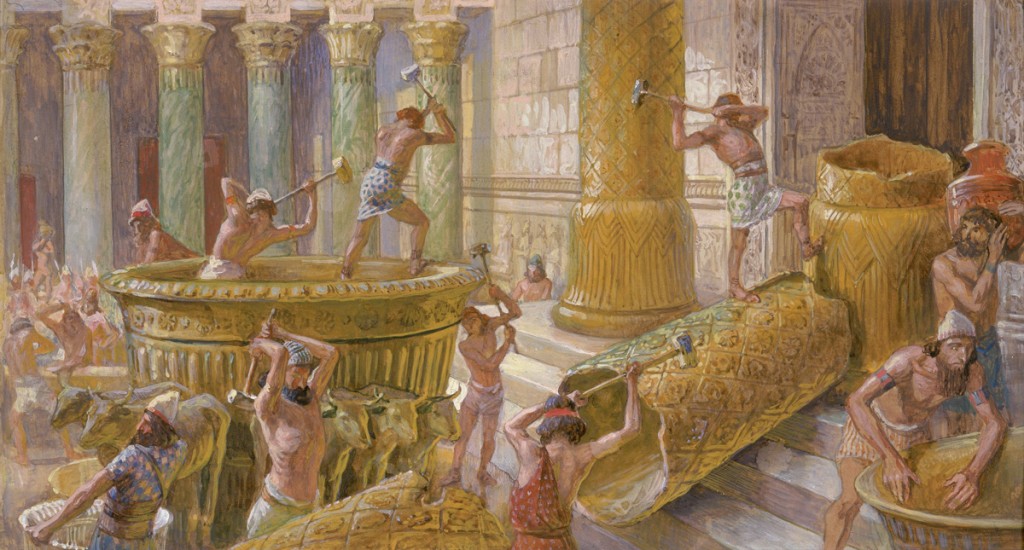Continued Rebellion
 With such an open display of the curse devouring the Northern Kingdom of Israel (see previous section) you would think that the survivors would have learned from their mistakes and would have carefully followed the Lord from that point forward. In King Hezekiah’s day this was certainly the case. Judah experienced tremendous revival and prosperity all the remaining days of his rule. In times of prophetic fulfillment (and Isaiah’s predictions definitely came true with devastating force) people always seemed to draw closer to God. Unfortunately, the time of blessing for Judah proved all too brief and their continued sin was about to lead to the scattering of Judah and Jerusalem. After the death of Hezekiah, his son Manasseh reigned in his stead. Instead of continuing in his father’s footsteps, however, Manasseh chose to become the most notorious and evil king in all of Judah’s history. In the book of 2 Kings these words are spoken about him:
With such an open display of the curse devouring the Northern Kingdom of Israel (see previous section) you would think that the survivors would have learned from their mistakes and would have carefully followed the Lord from that point forward. In King Hezekiah’s day this was certainly the case. Judah experienced tremendous revival and prosperity all the remaining days of his rule. In times of prophetic fulfillment (and Isaiah’s predictions definitely came true with devastating force) people always seemed to draw closer to God. Unfortunately, the time of blessing for Judah proved all too brief and their continued sin was about to lead to the scattering of Judah and Jerusalem. After the death of Hezekiah, his son Manasseh reigned in his stead. Instead of continuing in his father’s footsteps, however, Manasseh chose to become the most notorious and evil king in all of Judah’s history. In the book of 2 Kings these words are spoken about him:
“Because Manasseh, king of Judah, hath done these abominations, and hath done wickedly above all that the Amorites did, who were before him…
“…I am bringing such evil upon Jerusalem and Judah, that whosoever heareth of it, both of his ears shall tingle.
“And I will forsake the remnant of mine inheritance, and deliver them into the hand of their enemies; and they shall become a prey and a spoil to all their enemies…”
2 Kings 21:11-12,14
The march toward judgment was now unstoppable. Even when the Lord openly and miraculously helped his people in Hezekiah’s day, the next generation became more evil than even the Amorites whom the Lord had destroyed long ago when Israel came out of Egypt. Manasseh had taken Israel into such depths of unbelief and sin the Lord now said that no acts of righteousness afterward would make any difference. Judah must be scattered from the Promised Land in the same manner that Israel was removed fifty years before.
Even Josiah, who reigned after Manasseh’s son and who was renowned for his Godly leadership, couldn’t turn the hearts of people around enough to prevent the coming of the Lord’s judgment. For at the same time that King Josiah was obediently destroying the idols and foreign altars out of the land, a man by the name of Ezekiel was born who was destined to become the Lord’s prophet to a captured and defeated Judah in Babylon. Indeed, no people in any period had yet experienced greater prophecies of doom and gloom than in the days of Ezekiel and his counterparts, Jeremiah and Daniel. The Lord was about to destroy all of his people out of the land of Israel with such fury that the countryside itself would be left barren for generations to come. Yet even in the midst of this terrifying time of judgment, God still remembered and cared for those who were willing to follow him. In Jeremiah the Lord said…
“Return, thou backsliding Israel, saith the Lord, and I will not cause mine anger to fall upon you; for I am merciful, saith the Lord, and I will not keep anger forever.”
Jer. 3:12
In fact, the Lord continually kept a remnant of Jewish believers safe from harm. Despite the fall of most of the nation to foreign armies, there were always men and women who retained a true faith in God and refused to do evil. Be assured that in times of deepest trouble the Lord will stand by those who follow him. At the time of the end it will be no different. Jesus promised that he will be with us “even unto the end of the age.” Anyone who hears the words of his Gospel and turns from sin to faith and obedience will be saved from the judgment of God regardless of the time in which they live.
The Attack of Babylon
For decades Ezekiel and Jeremiah preached to a rebellious nation that would not listen. Just like Isaiah before them, they too warned of the impending attack of an expanding empire from the east. It was not the Assyrians this time, but the Babylonians under the leadership of Nebuchadnezzar that now threatened the land. By Ezekiel’s day, Assyria had been defeated and its capital, Nineveh, destroyed through a successful uprising of several provinces it had controlled. Babylon, which was the most powerful of these provinces, sought to consolidate the former Assyrian territories under its own authority.
Nebuchadnezzar’s army pushed toward the west in the same manner that Tiglath-Pileser had done a century and a half before during Isaiah’s time. Again, the decisive battle took place in northern Mesopotamia when Nebuchadnezzar defeated Pharaoh Necho at Carchemish in 605 B.C. With the Egyptians subdued, Babylon was now free to enter Palestine and all of the countries to the west—including the small nation of Judah.
In the summer of 605 B.C., Babylon finally attacked the Lord’s once-mighty people. Instead of completely destroying them, however, Nebuchadnezzar chose to set up a puppet government and take captive the leaders of the people as well as the most promising young men to prevent the possibility of future rebellion. The prophet Daniel was among the first of those captives taken to Babylon. His is a story which proves that the grace of God is real even in the darkest of hours. The Lord actually ended up using Daniel as a prophet and witness to the leadership in Babylon to let Nebuchadnezzar know that a higher power was really in control.
The Jewish nation might have survived in this state of foreign control indefinitely if it had not been for the Godless government that took over in Jerusalem. Jeremiah, who was the Lord’s prophet to those left in Palestine, counseled to let the situation be lest things get worse. Instead of listening to God’s prophet, however, Judah made the mistake of looking toward Egypt for military help. Judah sought to purchase the armaments of Egypt rather than seeking protection from the Lord. As a result, Nebuchadnezzar had no choice but to attack again. In 597 B.C., Judah bore the brunt of the Babylonian army for the second time. In this instance, large portions of the population were lead away to live in refugee camps scattered around the Mesopotamian valley. In one such camp outside the city of Babylon, the prophet Ezekiel was taken. This man was destined to be the third leg of the Lord’s triumvirate—functioning primarily as a prophet to the Jews held captive in Babylon.
Though judgment had come just as Moses had predicted and most of the nation was now scattered away from the Promised land, the Lord still had every segment of the Jewish population covered by a prophet—Ezekiel among the captives in Babylon, Daniel in the very court of Nebuchadnezzar, and Jeremiah remaining in Israel. Logically you would think that after all these prophecies coming true, Israel would have quickly realized its plight and turned back to God. Unfortunately, the gruesome fact remained that for all practical purposes the country of Israel no longer existed. The Jews remaining in Palestine continued to live there only as it served Nebuchadnezzar’s purpose of being a world-conqueror. The region could still profit the Babylonians despite its ruined state, because it stood in the unique geographical position at the crossroad to three continents. Whoever controlled that small piece of real estate could hold the fortunes of world trade in the palm of their hands.
Once the destruction of Israel began, it seemed inevitable to go on to completion. Only the Lord could break the stranglehold of the Babylonian army, and he would not do so unless his people repented and turned back to him in faith. God even told Ezekiel that the Israelites were a stubborn lot and would refuse to repent despite all that had happened. Less than ten years after that second invasion of Israel, the Jews proved that description accurate when the last king of Judah, Zedekiah, once again rebelled against Babylon by refusing to pay tribute. For Nebuchadnezzar, this was the last straw. The assembled armies of the Babylonian Empire began to march toward Palestine for the third and final time. Ezekiel records the following:
“Again, in the ninth year, in the tenth month, in the tenth day of the month, the word of the Lord came unto me, saying,
“Son of man, write the name of the day, even of this same day; the king of Babylon set himself against Jerusalem this same day.”
Ezekiel 24:1-2
Two years later, in 587 B.C., after an extended siege by the Babylonian army, the walls were breached, the city of Jerusalem was sacked, and the Temple was completely destroyed, just as Jeremiah and Ezekiel had predicted. The people of Judah who survived the attack were led away captive in mass to live lives of slavery in Babylon. Israel had indeed suffered the curse of scattering just as Moses and the prophets had predicted. The irrefutable fact remains that Moses prophesied of these things long before the people had even crossed the Jordan into the Promised Land. It never ceases to amaze me how people can deny the truth and inspiration of the Bible when prophecies like these came true exactly as they were written.
In spite of the sin-brought horrors of judgment that the Babylonians inflicted on the Jewish people, the Lord still showed himself merciful. Just as he had prophesied through Jeremiah (Jer. 25:11), God allowed the faithful and repentant to return to Israel exactly seventy years later. However, this homecoming was not a restoration of Judah to the glory days that the country had experienced before its decline. Things would never be the same as they were during King David’s reign. From the moment of the first Babylonian attack, the nation of Israel was destined to become subservient to every major empire that arose in the region. In future centuries, the Babylonians, the Persians, the Greeks, and the Romans would take turns controlling the land and keeping under submission any Israelis or other nationalities that remained in the area. The only exception to this rule was during the relatively brief period of semi-independence as a result of the Maccabean revolt in the middle of the second century B.C. The warriors of the renowned Hasmonean dynasty reached the pinnacle of power in the early part of the first century B.C. Unfortunately, the successes of their Maccabean kingdom were to be short-lived, because of the rise of the most powerful world empire to date.
Roman Domination
In 63 BC, the Roman army, which had been gradually annexing the Hellenistic east, entered Judea proper under the leadership of Pompey. It wasn’t long before they successfully battled their way to the gates of Jerusalem. After positioning their siege machines and catapults, the city quickly fell to the forces of the massive fourth world Empire. The territory of Israel once again became nothing more than another Province controlled by the central Roman government.
 It has now become quite clear that from the judgment of the Babylonian captivity forward, the Jewish people have almost continually existed as a subjugated state within the territorial interests of some superior power. Although many Jews remained settled in and around the former state of Israel, their autonomy and local governing authority was usually severely limited by a sequence of controlling empires. By the time Jesus arrived on the scene, Roman control had been firmly established in the land by Herod the Great. Herod was the first ruler of the new Palestinian Province, but he was bitterly hated by the Jews because of his Edomite heritage. Even though he spectacularly renovated the second temple (the first one had been destroyed by Nebuchadnezzar of Babylon) and added many other glorious architectural structures to the city of Jerusalem, it was all done for personal power and political gain and not out of a love of God or his people.
It has now become quite clear that from the judgment of the Babylonian captivity forward, the Jewish people have almost continually existed as a subjugated state within the territorial interests of some superior power. Although many Jews remained settled in and around the former state of Israel, their autonomy and local governing authority was usually severely limited by a sequence of controlling empires. By the time Jesus arrived on the scene, Roman control had been firmly established in the land by Herod the Great. Herod was the first ruler of the new Palestinian Province, but he was bitterly hated by the Jews because of his Edomite heritage. Even though he spectacularly renovated the second temple (the first one had been destroyed by Nebuchadnezzar of Babylon) and added many other glorious architectural structures to the city of Jerusalem, it was all done for personal power and political gain and not out of a love of God or his people.
Slowly but surely, the land that was promised to Abraham and his descendents had once again become a prosperous and profitable asset to another World Empire. The seeds of Jewish impatience with this situation had grown to such an extent that when Jesus began his ministry even one of his disciples was called a zealot to mark the truth of his revolutionary dreams of freeing Israel from the yoke of foreign dominion. Many people believed (or were certainly hoping) that the Messiah would immediately free them from the yoke of gentile rule and set up the kingdom of God. The scriptures had certainly stated that the Savior would come and rule the nations with a rod of iron and establish Israel as the primary nation of the world. If Jesus were truly the “Anointed One” from God then surely he would fulfill this prophecy, right?



